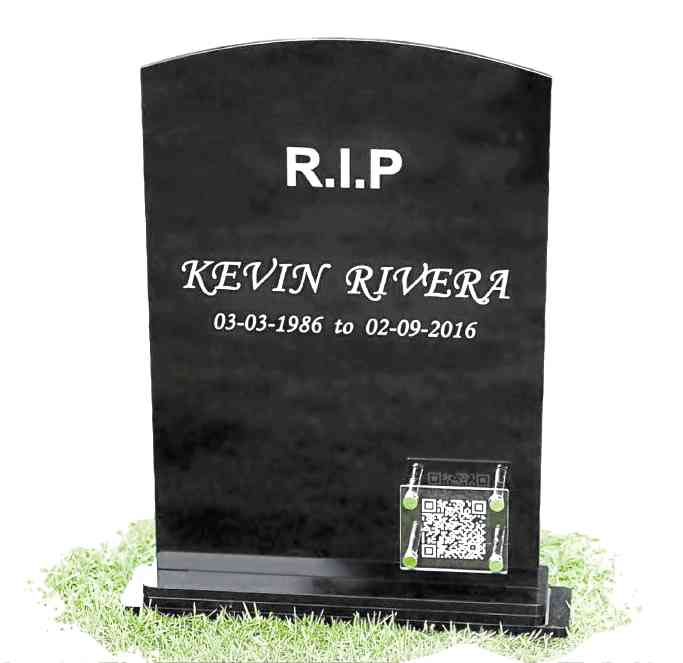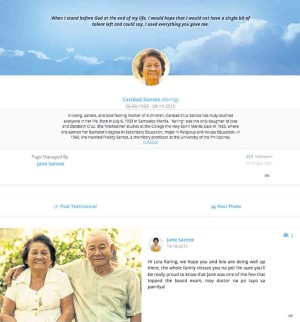Facebook is old enough by now that every one of us has experienced the situation: Someone passes away, and an inevitable stream of eulogizing comments will follow on that person’s profile, from family, friends, and acquaintances alike.
Did this ever strike you as inappropriate? Jovan Que and Armand Pagcaliwagan, the founders of Cloud Memorials, felt the same when it happened to them.
One of Pagcaliwagan’s friends and blockmates passed away, and people took to her Facebook wall to grieve and memorialize her.
“We used her Facebook profile as an outlet, but as the months passed, we didn’t like the attention we were getting from it. We felt that posting something on her wall attracted a lot of unwanted attention,” Pagcaliwagan says.
Pagcaliwagan and Que thus formed Cloud Memorials, which they billed as a more solemn place for people to memorialize their dearly departed.
In the larger picture, they wanted to help people through the grieving process by giving them a place to grieve without all the clutter you would associate with a social media platform like Facebook.
Cloud Memorials is part of a new market in digital death or memorial services. According to Pagcaliwagan, Cloud Memorials is unique because it is the first of its kind not only in the Philippines, but also in the Southeast Asia, and that it is the first to offer users a feature that allows them to create a biography for their loved ones.
Cloud Memorials began as a private platform for the use of the founder’s family and friends. After seeing how much it helped—one friend commented that it felt like a “a heavy weight was lifted from my heart”—they opened it to the public.
Creating an online biography for someone who has died is currently free, but the founders are thinking of ways to switch to a “freemium” business model—top-up, premium features are charged on top of the basic plan.
“Cloud Memorials started off as a private platform for the use of family and friends. Our advocacy to have each life story remembered was and is still our main focus,” he says.
Cloud Memorials also extends into the real world. They supply users with a QR code that can be put on their loved
BRAVE TEAM. (From left) Harold Ocampo (web developer), Armand Pagcaliwagan (co-founder), Jovan Que (founder), Ian Oblepias (creative content), Mark Segalle (mobile developer)
one’s tomb. Through this QR code, anyone can access that person’s biography when they visit the grave.
This feature was inspired by their own experiences. When they would visit the cemetery, they noticed that most graves only had the person’s name, their birthdate and date of death, along with, at most, a few words of remembrance. Given this bare minimum of information, the founders wanted to provide more.
“This cluelessness and curiosity was something we wanted to address. We thought that what if one day, you can find out the story of each person in a cemetery,” Pagcaliwagan says.
Initially, the two founders marketed Cloud Memorials toward millennials, believing that it would be a perfect platform for digital natives to memorialize the loved ones that they have lost. There was less demand with this demographic than they anticipated, however.
“Upon further market validation, we realized that the habit of memorializing was not something that millennials practice often. The whole culture of ‘living in the moment’ was more common than ‘reliving the past,’” Pagcaliwagan says.
They thus moved onto an older market, whom Pagcaliwagan describes as moms, dads, titos, and titas. After doing market research with them, the founders affirmed that they were the right demographic to talk to—it was a part of their culture to remember the past and memorialize.
Still, no matter a person’s age, the founders have gotten criticism for Cloud Memorials, due to the sensitive nature of the business. Some said that there service was “dark,” while others have expressed that they were “making money from the dead.”
In these cases, the founders return to their mission: They aim to help people through the grieving process by focusing not just on the death of their loved one.
“For us, Cloud Memorials is all about remembering how a person lived. Through the platform, we enrich the process of memorialization and even make it a more heart ening experience,” he says.
Toward that end, the product roadmap of Cloud Memorials has features in place that Pagcaliwagan hopes will help users achieve this goal. One of these features is a family tree, so you can track a loved one’s lineage. Another is pre-planning services for people who are already terminally ill.
In the long term, their goal is to have everyone’s story told.
“We don’t believe that only the famous people have the right to be remembered or even have a biography of their own. Each life has a story to tell. It is up to the ones left behind to tell their story and to keep them alive in our minds and hearts,” Pagcaliwagan says.
Given that Cloud Memorials operates in such a unique space compared to other tech startups in the Philippines, Pagcaliwagan advises Filipino entrepreneurs to also buck the trend of what’s popular, but go with where their passion lies.
“When you think of money and the project prolongs, you realize how many more ways there is to earn money and you will lose track and sight of what you initially started,” he says.
In contrast, when a project is fueled by genuine passion, Pagcaliwagan believes that your motivation will run deeper and others will notice.
“Every small achievement matters and trust me on this one, you will be recognized for it. People can tell if you’re after their money or if you’re there to change their lives for the better,” he says.



